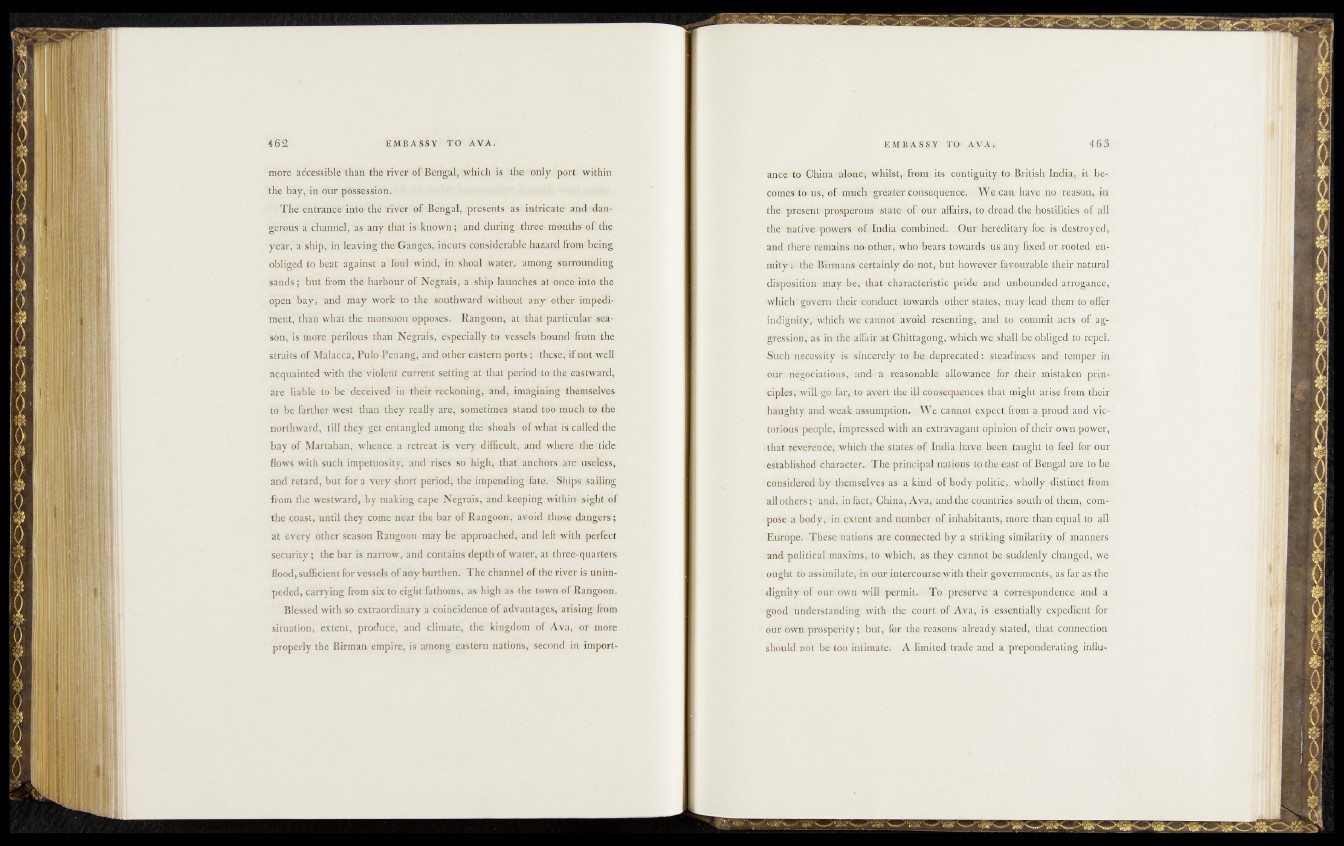
more accessible than the river of Bengal, 'which is the only port within
the bay,'iri our possession.|l fi1
: Tne entrance'into the fiver of Bengal, presents as intricate and dan-
gefotts: a chanhel, as any that is kQovrai' aridduririg' tfaree-ttprithshofthe
ye'ar, a ship, in leaving’the'Ganges, incurs considerable hazard from being
obliged to beat against a foulwiridf ih- shoal watery among surrounding
sand's ; but from the harbour ofNegrais, a;ship launches at'once1 into the
bpen hayy and may Vifork' to ^ h e Southvvard Without aflybtfeer i-mpefli-
ment, than what the monsoon opposes. Rangoon, at that particular season,
is more perilous than Negrais, especially to vessels bound from the
straits of Malacca, Pulo-Penang, and Other easternports; these, if not well
acquainted with the violent current setting at' that periddUothe eastward,
are liable to be deceived in their reckoning, and1, imagining themselves
to be farther west than they really are, sometimes stand too much to the
northward, till they get 'entangled among the shoals of what is called the
bay of Martaban, whence a retreat is very difficult, and where the tide
flows with such impetuosity, and rises so high, that an'chors are-useless,
and retard, but for a very short period, the impending fate. Ship's sailing,
from the westward, by making cape Negrais, and keeping, within sight of
the coast, until they come near the bar of Rangoon, avoid those dangers;
at every other season Rangoon may be approached, and left with perfect
security; the bar is narrow, and contains'depth of water, at three-quarters
flood, sufficient for vessels of any burthen. The channel of the river is unimpeded,
carrying from six to eight fathoms, as high as the town of Rangoon.
Blessed with so extraordinary a Coincidence of advantages, arising from
situation, extent, produce, arid climate', the kingdom of Ava, or more
properly the Birman empire,- is among eastern nations, second in importanteW
© flMto'alones Vhi-lst,i from ■ its; 60ritigpijjyi'tp.; ^ritish'India, it her,
comes rib -us, of imiuhljirigreateS'tcorisriqrienpe'-f-'Werfanr have poi reason, in
thes prefe^rit! i prpspBToks
. t’tetiiftwetpowrifri
arid there remains mbinther,'who bears towafdsbtJS’^ri^ fegd or-rooted enmity
: the-iBirmans certainly domotj'bufcrho^qVe^favfriu^aJale'dheir natural
disposition ‘.maybe, that ehapaeteristio prjdetapdf1'Sakriupded arrogance,
which /govern- their/canduet' towards otlieij states, ma\ lead them to 'oiler
indfenitys^hich we cannot ’avoid resenting,;, and rio; coppj%$p% pf-ag-
■grrission, as inriihe affairlatfChitfagongc.whjoh;we*,shall,b(fi|bj;ige_d(,tq^rppel.
•Srifch necessits is>.sincerely, to bei duprocaLtd: steadiness diul ti-mpm^ui,
orir 'negotiations,; and* a , Seasonably aljswapcp»iciiii their.' mistaken prim
'ciples,' aviik^o- far, to avert the ill popsjejquences that might arise from their
haughty and'weak- assumption. We cannpt fropi v^gfoud, and,yk4,
toTibu& people, impressed'with an extravagant dpifponrif th'eir, ownpower,
I that, revetebce, which the states>pf India<hayA-^epj^ught tqtfeel‘ for- our
established thsdSeiefe The principal nations to thejea&t'of Bengal arc to bo
considered :by themselvesas a kind pf b'odyfpjsli|S®; wholly dispnet-ftiom
all others M and, in fact, China, A va^and ^he^^ejun^ie^i^putlMsf fekfemt* gam-
pose ^'&ody,i in extent and number Q^kihabitgntss,nj.pre;than?eqp^l tp gll‘
Europe.'Theserriations are fcoiiaricted by a striking similarity qf manners
arid politkal maximSjfto ;VRhich, as they ■qannpt-hg’s u d d e n l y . . y e
ought tb assimilatey in due intercourse with their goyernmcntsv as,farlSis the
dignity: of ouEf ow^'^lbpejmit.^ t®ov preserve ja correspondence, a
good understariding with the court of Ava, is- essentially egcgfet||ent for
Orif owrif prosperitypbtff, fbnlfh||hi3eas<}hs alre;adytstatedyrthofeif®^^ion
shfiMtt'ilt be too intimate. A-limited; trade and a preponderating influ